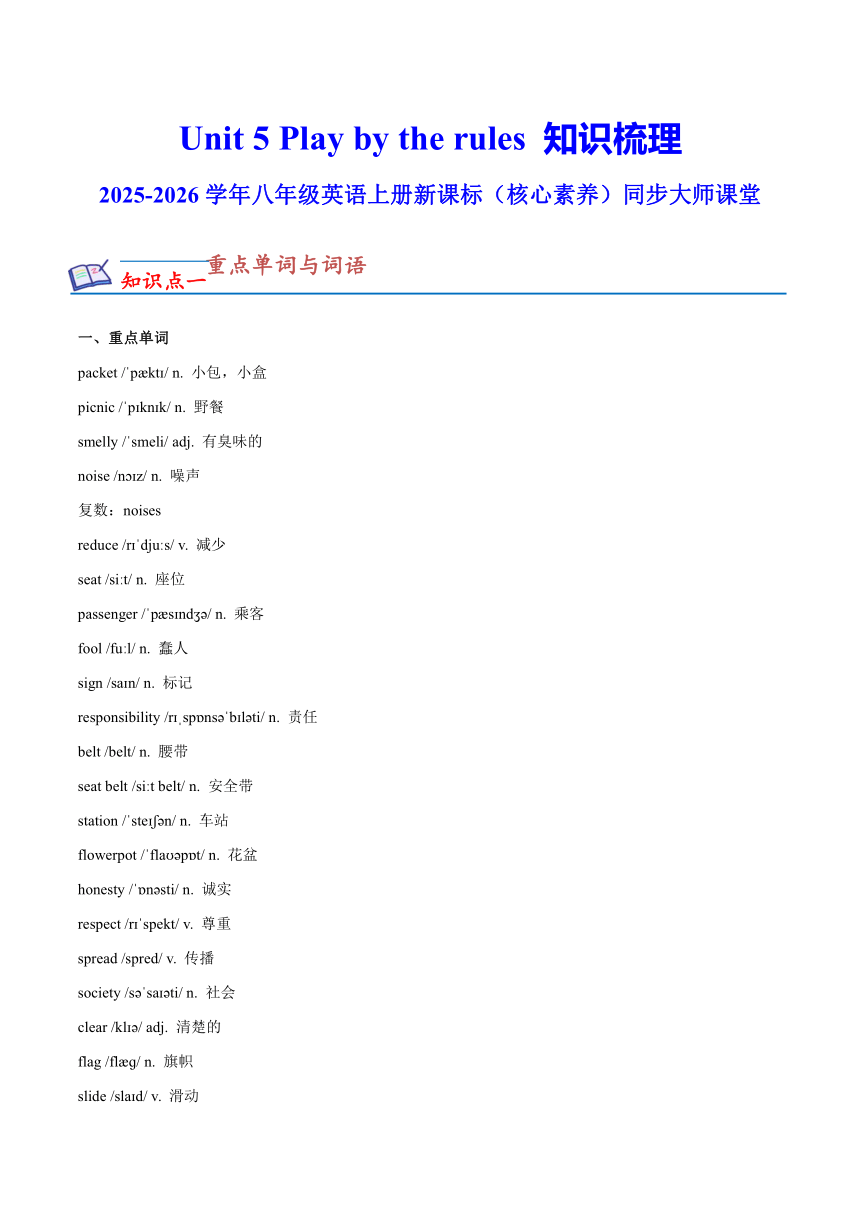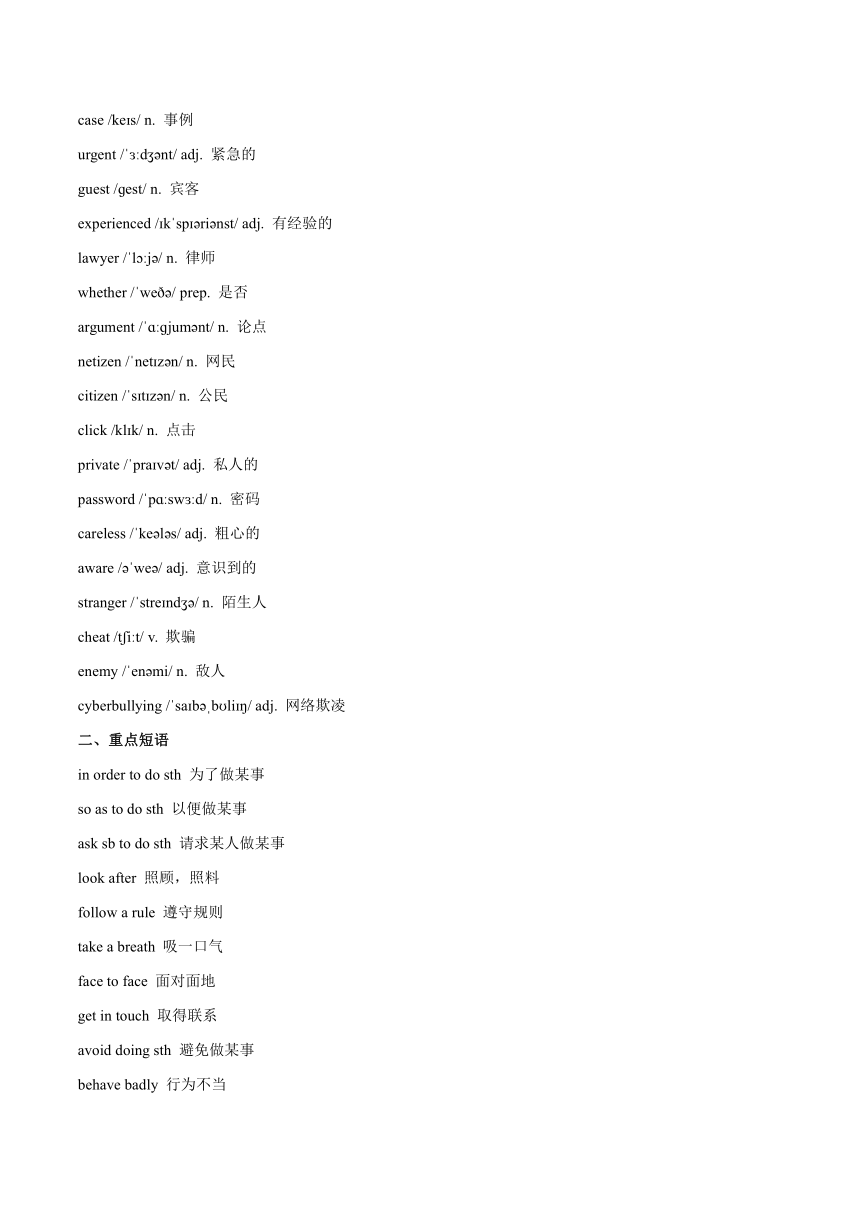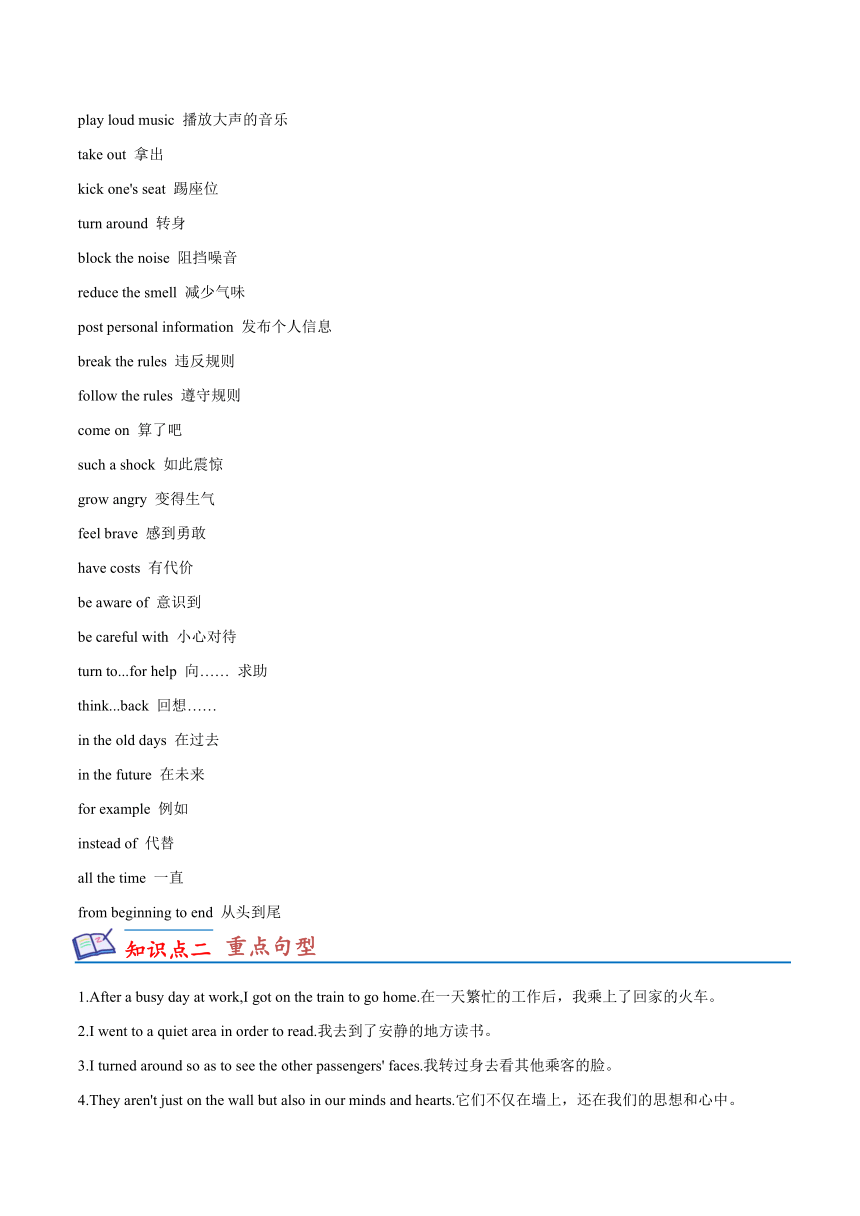Unit 5 Play by the rules 知识梳理-2025-2026学年八年级英语上册新课标(核心素养)同步大师课堂(外研版2024)
文档属性
| 名称 | Unit 5 Play by the rules 知识梳理-2025-2026学年八年级英语上册新课标(核心素养)同步大师课堂(外研版2024) |  | |
| 格式 | docx | ||
| 文件大小 | 35.9KB | ||
| 资源类型 | 教案 | ||
| 版本资源 | 外研版 | ||
| 科目 | 英语 | ||
| 更新时间 | 2025-07-15 11:29:18 | ||
图片预览



文档简介
Unit 5 Play by the rules 知识梳理
2025-2026学年八年级英语上册新课标(核心素养)同步大师课堂
(
重点单词与词语
) (
知识点一
)
一、重点单词
packet / p kt / n. 小包,小盒
picnic / p kn k/ n. 野餐
smelly / smeli/ adj. 有臭味的
noise /n z/ n. 噪声
复数:noises
reduce /r dju s/ v. 减少
seat /si t/ n. 座位
passenger / p s nd / n. 乘客
fool /fu l/ n. 蠢人
sign /sa n/ n. 标记
responsibility /r sp ns b l ti/ n. 责任
belt /belt/ n. 腰带
seat belt /si t belt/ n. 安全带
station / ste n/ n. 车站
flowerpot / fla p t/ n. 花盆
honesty / n sti/ n. 诚实
respect /r spekt/ v. 尊重
spread /spred/ v. 传播
society /s sa ti/ n. 社会
clear /kl / adj. 清楚的
flag /fl ɡ/ n. 旗帜
slide /sla d/ v. 滑动
case /ke s/ n. 事例
urgent / d nt/ adj. 紧急的
guest /ɡest/ n. 宾客
experienced / k sp ri nst/ adj. 有经验的
lawyer / l j / n. 律师
whether / we / prep. 是否
argument / ɑ ɡjum nt/ n. 论点
netizen / net z n/ n. 网民
citizen / s t z n/ n. 公民
click /kl k/ n. 点击
private / pra v t/ adj. 私人的
password / pɑ sw d/ n. 密码
careless / ke l s/ adj. 粗心的
aware / we / adj. 意识到的
stranger / stre nd / n. 陌生人
cheat /t i t/ v. 欺骗
enemy / en mi/ n. 敌人
cyberbullying / sa b b li / adj. 网络欺凌
二、重点短语
in order to do sth 为了做某事
so as to do sth 以便做某事
ask sb to do sth 请求某人做某事
look after 照顾,照料
follow a rule 遵守规则
take a breath 吸一口气
face to face 面对面地
get in touch 取得联系
avoid doing sth 避免做某事
behave badly 行为不当
play loud music 播放大声的音乐
take out 拿出
kick one's seat 踢座位
turn around 转身
block the noise 阻挡噪音
reduce the smell 减少气味
post personal information 发布个人信息
break the rules 违反规则
follow the rules 遵守规则
come on 算了吧
such a shock 如此震惊
grow angry 变得生气
feel brave 感到勇敢
have costs 有代价
be aware of 意识到
be careful with 小心对待
turn to...for help 向…… 求助
think...back 回想……
in the old days 在过去
in the future 在未来
for example 例如
instead of 代替
all the time 一直
(
知识点二
) (
重点句型
)from beginning to end 从头到尾
1.After a busy day at work,I got on the train to go home.在一天繁忙的工作后,我乘上了回家的火车。
2.I went to a quiet area in order to read.我去到了安静的地方读书。
3.I turned around so as to see the other passengers' faces.我转过身去看其他乘客的脸。
4.They aren't just on the wall but also in our minds and hearts.它们不仅在墙上,还在我们的思想和心中。
5.And rules are there for us to follow! 而且规则是让我们去遵守的!
6.Think 20 years back when chatting face to face with loved ones far away was a dream.
想想20年前,与远方的亲人面对面聊天是一个梦想。
7.To protect your online accounts, it's important to use a"strong and long" password.
为了保护你的在线账户,使用一个“强而长”的密码是很重要的。
8.Remember that behaving badly online has costs.记住,在网上行为不端是有代价的。
9.If you find yourself in hot water, don't answer any bad messages.
如果你发现自己陷入了困境,不要回应任何恶意信息。
10.Instead, turn to your parents, teachers or other trusted adults for help.
(
重点语法
)相反,请向你的父母、老师或其他值得信赖的成年人寻求帮助。
(
知识点三
)
动词不定式作目的状语
1. 基本结构与含义
动词不定式作目的状语,通常由“to + 动词原形”构成,用来表明句子谓语动词行为的目的,回答“为什么做某事(Why do sth. )”这一问题 。它在句中位置较为灵活,可置于句首,也可放在句末。
置于句首时,通常用逗号与句子其他部分隔开,起到强调目的的作用,使读者或听者一开始就明确行为的意图。例如:To get good grades, she studies hard every day.(为了取得好成绩,她每天都努力学习。)这里“To get good grades”置于句首,突出了“努力学习”的目的是“取得好成绩” 。
置于句末时,一般不用逗号隔开,是较为常见的表达方式。例如:She studies hard every day to get good grades.(她每天努力学习为了取得好成绩。)此时句子重心先落在“她每天努力学习”这一行为上,最后说明目的。
2. 用法例析
To pass the exam, he reviewed his lessons carefully.(为了通过考试,他认真复习功课。):在这个句子中,“To pass the exam”是动词不定式短语作目的状语。句子的谓语动词是“reviewed”,“he”是执行者。“To pass the exam”表明了“he reviewed his lessons carefully”的目的是“通过考试”。如果对这个句子的目的状语进行提问,就是“Why did he review his lessons carefully (他为什么认真复习功课?)”,回答就是“To pass the exam.(为了通过考试。)”。
She gets up early every morning to catch the first bus.(她每天早上早早起床为了赶上第一班公交车。):“To catch the first bus”是目的状语,说明“gets up early”的目的。“She”是主语,“gets up”是谓语。同样,如果问“Why does she get up early every morning (她为什么每天早上早早起床?)”,答案就是“To catch the first bus.(为了赶上第一班公交车。)” 。
3. 与其他表目的结构的转换
in order to:“in order to + 动词原形”也表示目的,与“to + 动词原形”用法相似,可位于句首或句末。位于句首时,同样用逗号隔开;位于句末时,不用逗号隔开。例如:In order to pass the exam, he reviewed his lessons carefully. = He reviewed his lessons carefully in order to pass the exam.(为了通过考试,他认真复习功课。)不过“in order to”结构相比单纯的“to”结构,语气上稍显正式 。
so as to:“so as to + 动词原形”同样表目的,但它只能位于句末,不能用于句首。例如:She gets up early every morning so as to catch the first bus.(她每天早上早早起床以便赶上第一班公交车。)不能写成“So as to catch the first bus, she gets up early every morning.” 。
so that / in order that:这两个短语后面接从句,从句中通常有情态动词,如“can / could / may / might”等,用来表示目的。例如:He reviewed his lessons carefully so that he could pass the exam.(他认真复习功课以便他能通过考试。)She gets up early every morning in order that she can catch the first bus.(她每天早上早早起床以便她能赶上第一班公交车。) 与“to do”“in order to do”“so as to do”不同的是,“so that / in order that”引导的是目的状语从句,有完整的主谓结构 。
4. 否定形式
(
重点知识
)动词不定式作目的状语的否定形式是在“to”前面加“not”,即“not to + 动词原形” 。例如:He worked hard not to fail the exam.(他努力学习以免考试不及格。)这里“not to fail the exam”是“worked hard”的目的,即努力学习是为了避免不及格。又如:She got up early not to be late for school.(她早早起床为了上学不迟到。)“not to be late for school”明确了“got up early”的目的是防止上学迟到 。
(
知识点四
)
1、I covered my ears in order to block the noise coming from Rock Girl.我捂住耳朵,以阻挡“摇滚女孩”发出的噪声。
noise /n z/ n.噪声;嘈杂声,既可作可数名词,又可作不可数名词。
make(a)noise 制造噪声,发出声音
形容词形式为noisy“吵闹的;嘈杂的”。
It’s noisy outside. Let’s go out and see who is making such a noise.
外面很吵闹,我们出去看看是谁在制造这种噪声。
【辨析】
noise 多指不悦耳的吵闹声、嘈杂声,可与make连用
sound 泛指能听见的自然界的各种声音,不带有任何感彩
voice 多指人说话或唱歌的声音
2、I covered my nose so as to reduce the smell coming from Mr Smelly Food.我捂住鼻子,以减少来自“难闻食物先生”的气味。
reduce /r dju:s/ v.缩小;减少;降低
reduce...to...把……减少到……
reduce...by...把……减少了……
3、Then a boy behind me started to kick my seat.这时,我身后的一个男孩开始踢我的座位。
seat /si:t/ n. 座,座位
【辨析】
词性 词义
seat 名词 座位
及物动词 (使)就座;可坐……人
sit 不及物动词 坐
The hall of the restaurant seats 300 people.
这家饭店的大厅能坐300人。
The waitress seated the guests at the table and they sat down in their seats.
女服务员安排客人们在桌旁就座,他们都坐在了座位上。
4、My face turned as red as a tomato!我的脸变得通红!
as red as a tomato脸色通红,是一种比喻的修辞方式,常用来表达生气、害羞、尴尬等情绪。
5、Standing up to bad behaviour对不文明行为说“不”
1)stand up to抵抗;勇敢反对
It was brave of her to stand up to those bullies.
她能站出来反抗那些霸凌者,真是太勇敢了。
2)stand up for支持;维护
You have to stand up for yourself.
你必须为自己挺身而出。
6、I picked up the pieces/clean up the mess我捡起碎片/收拾了一下。
pick up捡起,拾起,为“动词+副词”型短语。
pick+名词+up=pick up+名词
pick+人称代词+up
接电话 I called you last night, but you didn’t pick up.我昨晚给你打电话了,但是你没接。
搭载;(开车)接人 Shall we go to the airport to pick up your sister?我们去机场接你妹妹好吗?
7、His honesty made me respect him.他的诚实让我敬佩。
honesty / n sti/ n.诚实,正直;坦诚 honest(adj.诚实的;坦诚的)
respect /r spekt/ v.尊重, 后常接名词或代词作宾语。
respect sb. for(doing)sth.因(做)某事而尊敬某人
I respect their views, although I do not agree with them.
虽然我不同意,但是我尊重他们的观点
8、sharing my story/spread some happiness 分享我的故事/传播一些快乐。
spread /spred/ v.传播, 其过去式和过去分词均为spread。
9、Avoid posting personal information online. 避免在网上发布个人信息。
avoid doing sth.避免做某事
We should avoid making a noise in the library.
我们应该避免在图书馆内发出噪声。
10、Be aware of strangers.注意陌生人。
aware / we / adj.意识到的,明白的,知道的
1)be aware of+名词/代词/宾语从句
He was well aware of the problem.
他很清楚这个问题。
2)be aware+that从句
I was aware that she was trembling.
我意识到她在发抖
11、Instead, turn to your parents, teachers or other trusted adults for help.相反,你应该向你的父母、老师或其他值得信赖的成年人寻求帮助。
turn to求助于,求教于,后面可以接人或事物,且常与for连用。
She turned to a friend for support.她向一位朋友寻求支持。
2025-2026学年八年级英语上册新课标(核心素养)同步大师课堂
(
重点单词与词语
) (
知识点一
)
一、重点单词
packet / p kt / n. 小包,小盒
picnic / p kn k/ n. 野餐
smelly / smeli/ adj. 有臭味的
noise /n z/ n. 噪声
复数:noises
reduce /r dju s/ v. 减少
seat /si t/ n. 座位
passenger / p s nd / n. 乘客
fool /fu l/ n. 蠢人
sign /sa n/ n. 标记
responsibility /r sp ns b l ti/ n. 责任
belt /belt/ n. 腰带
seat belt /si t belt/ n. 安全带
station / ste n/ n. 车站
flowerpot / fla p t/ n. 花盆
honesty / n sti/ n. 诚实
respect /r spekt/ v. 尊重
spread /spred/ v. 传播
society /s sa ti/ n. 社会
clear /kl / adj. 清楚的
flag /fl ɡ/ n. 旗帜
slide /sla d/ v. 滑动
case /ke s/ n. 事例
urgent / d nt/ adj. 紧急的
guest /ɡest/ n. 宾客
experienced / k sp ri nst/ adj. 有经验的
lawyer / l j / n. 律师
whether / we / prep. 是否
argument / ɑ ɡjum nt/ n. 论点
netizen / net z n/ n. 网民
citizen / s t z n/ n. 公民
click /kl k/ n. 点击
private / pra v t/ adj. 私人的
password / pɑ sw d/ n. 密码
careless / ke l s/ adj. 粗心的
aware / we / adj. 意识到的
stranger / stre nd / n. 陌生人
cheat /t i t/ v. 欺骗
enemy / en mi/ n. 敌人
cyberbullying / sa b b li / adj. 网络欺凌
二、重点短语
in order to do sth 为了做某事
so as to do sth 以便做某事
ask sb to do sth 请求某人做某事
look after 照顾,照料
follow a rule 遵守规则
take a breath 吸一口气
face to face 面对面地
get in touch 取得联系
avoid doing sth 避免做某事
behave badly 行为不当
play loud music 播放大声的音乐
take out 拿出
kick one's seat 踢座位
turn around 转身
block the noise 阻挡噪音
reduce the smell 减少气味
post personal information 发布个人信息
break the rules 违反规则
follow the rules 遵守规则
come on 算了吧
such a shock 如此震惊
grow angry 变得生气
feel brave 感到勇敢
have costs 有代价
be aware of 意识到
be careful with 小心对待
turn to...for help 向…… 求助
think...back 回想……
in the old days 在过去
in the future 在未来
for example 例如
instead of 代替
all the time 一直
(
知识点二
) (
重点句型
)from beginning to end 从头到尾
1.After a busy day at work,I got on the train to go home.在一天繁忙的工作后,我乘上了回家的火车。
2.I went to a quiet area in order to read.我去到了安静的地方读书。
3.I turned around so as to see the other passengers' faces.我转过身去看其他乘客的脸。
4.They aren't just on the wall but also in our minds and hearts.它们不仅在墙上,还在我们的思想和心中。
5.And rules are there for us to follow! 而且规则是让我们去遵守的!
6.Think 20 years back when chatting face to face with loved ones far away was a dream.
想想20年前,与远方的亲人面对面聊天是一个梦想。
7.To protect your online accounts, it's important to use a"strong and long" password.
为了保护你的在线账户,使用一个“强而长”的密码是很重要的。
8.Remember that behaving badly online has costs.记住,在网上行为不端是有代价的。
9.If you find yourself in hot water, don't answer any bad messages.
如果你发现自己陷入了困境,不要回应任何恶意信息。
10.Instead, turn to your parents, teachers or other trusted adults for help.
(
重点语法
)相反,请向你的父母、老师或其他值得信赖的成年人寻求帮助。
(
知识点三
)
动词不定式作目的状语
1. 基本结构与含义
动词不定式作目的状语,通常由“to + 动词原形”构成,用来表明句子谓语动词行为的目的,回答“为什么做某事(Why do sth. )”这一问题 。它在句中位置较为灵活,可置于句首,也可放在句末。
置于句首时,通常用逗号与句子其他部分隔开,起到强调目的的作用,使读者或听者一开始就明确行为的意图。例如:To get good grades, she studies hard every day.(为了取得好成绩,她每天都努力学习。)这里“To get good grades”置于句首,突出了“努力学习”的目的是“取得好成绩” 。
置于句末时,一般不用逗号隔开,是较为常见的表达方式。例如:She studies hard every day to get good grades.(她每天努力学习为了取得好成绩。)此时句子重心先落在“她每天努力学习”这一行为上,最后说明目的。
2. 用法例析
To pass the exam, he reviewed his lessons carefully.(为了通过考试,他认真复习功课。):在这个句子中,“To pass the exam”是动词不定式短语作目的状语。句子的谓语动词是“reviewed”,“he”是执行者。“To pass the exam”表明了“he reviewed his lessons carefully”的目的是“通过考试”。如果对这个句子的目的状语进行提问,就是“Why did he review his lessons carefully (他为什么认真复习功课?)”,回答就是“To pass the exam.(为了通过考试。)”。
She gets up early every morning to catch the first bus.(她每天早上早早起床为了赶上第一班公交车。):“To catch the first bus”是目的状语,说明“gets up early”的目的。“She”是主语,“gets up”是谓语。同样,如果问“Why does she get up early every morning (她为什么每天早上早早起床?)”,答案就是“To catch the first bus.(为了赶上第一班公交车。)” 。
3. 与其他表目的结构的转换
in order to:“in order to + 动词原形”也表示目的,与“to + 动词原形”用法相似,可位于句首或句末。位于句首时,同样用逗号隔开;位于句末时,不用逗号隔开。例如:In order to pass the exam, he reviewed his lessons carefully. = He reviewed his lessons carefully in order to pass the exam.(为了通过考试,他认真复习功课。)不过“in order to”结构相比单纯的“to”结构,语气上稍显正式 。
so as to:“so as to + 动词原形”同样表目的,但它只能位于句末,不能用于句首。例如:She gets up early every morning so as to catch the first bus.(她每天早上早早起床以便赶上第一班公交车。)不能写成“So as to catch the first bus, she gets up early every morning.” 。
so that / in order that:这两个短语后面接从句,从句中通常有情态动词,如“can / could / may / might”等,用来表示目的。例如:He reviewed his lessons carefully so that he could pass the exam.(他认真复习功课以便他能通过考试。)She gets up early every morning in order that she can catch the first bus.(她每天早上早早起床以便她能赶上第一班公交车。) 与“to do”“in order to do”“so as to do”不同的是,“so that / in order that”引导的是目的状语从句,有完整的主谓结构 。
4. 否定形式
(
重点知识
)动词不定式作目的状语的否定形式是在“to”前面加“not”,即“not to + 动词原形” 。例如:He worked hard not to fail the exam.(他努力学习以免考试不及格。)这里“not to fail the exam”是“worked hard”的目的,即努力学习是为了避免不及格。又如:She got up early not to be late for school.(她早早起床为了上学不迟到。)“not to be late for school”明确了“got up early”的目的是防止上学迟到 。
(
知识点四
)
1、I covered my ears in order to block the noise coming from Rock Girl.我捂住耳朵,以阻挡“摇滚女孩”发出的噪声。
noise /n z/ n.噪声;嘈杂声,既可作可数名词,又可作不可数名词。
make(a)noise 制造噪声,发出声音
形容词形式为noisy“吵闹的;嘈杂的”。
It’s noisy outside. Let’s go out and see who is making such a noise.
外面很吵闹,我们出去看看是谁在制造这种噪声。
【辨析】
noise 多指不悦耳的吵闹声、嘈杂声,可与make连用
sound 泛指能听见的自然界的各种声音,不带有任何感彩
voice 多指人说话或唱歌的声音
2、I covered my nose so as to reduce the smell coming from Mr Smelly Food.我捂住鼻子,以减少来自“难闻食物先生”的气味。
reduce /r dju:s/ v.缩小;减少;降低
reduce...to...把……减少到……
reduce...by...把……减少了……
3、Then a boy behind me started to kick my seat.这时,我身后的一个男孩开始踢我的座位。
seat /si:t/ n. 座,座位
【辨析】
词性 词义
seat 名词 座位
及物动词 (使)就座;可坐……人
sit 不及物动词 坐
The hall of the restaurant seats 300 people.
这家饭店的大厅能坐300人。
The waitress seated the guests at the table and they sat down in their seats.
女服务员安排客人们在桌旁就座,他们都坐在了座位上。
4、My face turned as red as a tomato!我的脸变得通红!
as red as a tomato脸色通红,是一种比喻的修辞方式,常用来表达生气、害羞、尴尬等情绪。
5、Standing up to bad behaviour对不文明行为说“不”
1)stand up to抵抗;勇敢反对
It was brave of her to stand up to those bullies.
她能站出来反抗那些霸凌者,真是太勇敢了。
2)stand up for支持;维护
You have to stand up for yourself.
你必须为自己挺身而出。
6、I picked up the pieces/clean up the mess我捡起碎片/收拾了一下。
pick up捡起,拾起,为“动词+副词”型短语。
pick+名词+up=pick up+名词
pick+人称代词+up
接电话 I called you last night, but you didn’t pick up.我昨晚给你打电话了,但是你没接。
搭载;(开车)接人 Shall we go to the airport to pick up your sister?我们去机场接你妹妹好吗?
7、His honesty made me respect him.他的诚实让我敬佩。
honesty / n sti/ n.诚实,正直;坦诚 honest(adj.诚实的;坦诚的)
respect /r spekt/ v.尊重, 后常接名词或代词作宾语。
respect sb. for(doing)sth.因(做)某事而尊敬某人
I respect their views, although I do not agree with them.
虽然我不同意,但是我尊重他们的观点
8、sharing my story/spread some happiness 分享我的故事/传播一些快乐。
spread /spred/ v.传播, 其过去式和过去分词均为spread。
9、Avoid posting personal information online. 避免在网上发布个人信息。
avoid doing sth.避免做某事
We should avoid making a noise in the library.
我们应该避免在图书馆内发出噪声。
10、Be aware of strangers.注意陌生人。
aware / we / adj.意识到的,明白的,知道的
1)be aware of+名词/代词/宾语从句
He was well aware of the problem.
他很清楚这个问题。
2)be aware+that从句
I was aware that she was trembling.
我意识到她在发抖
11、Instead, turn to your parents, teachers or other trusted adults for help.相反,你应该向你的父母、老师或其他值得信赖的成年人寻求帮助。
turn to求助于,求教于,后面可以接人或事物,且常与for连用。
She turned to a friend for support.她向一位朋友寻求支持。
同课章节目录
